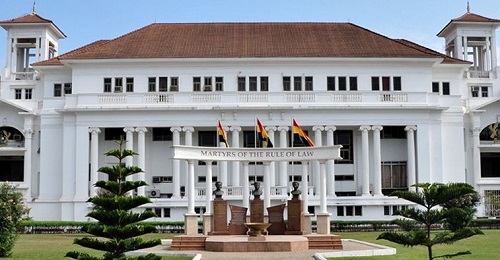Ensuring secure land tenure is crucial for improving land development, as both local and foreign investors often hesitate to engage in land transactions when there is uncertainty about ownership rights. The term "Land Tenure Insecurity" refers to the apprehension that someone else might claim ownership of the purchased land in the future, creating a significant risk for investment. This phenomenon is particularly common in the Sub-Saharan African Region of which Ghana is no exception. The positive impact of land tenure security is far-reaching. It can stimulate credit use by providing greater investment incentives, elevating the collateral value of land, facilitating efficient land transfer, reducing land disputes, and ultimately boosting productivity through increased investment.
In the context of Ghana, the land sector continues to face various challenges even after various interventions from both external and internal mechanisms. Widespread indiscipline in the land market, characterized by multiple sales, unapproved development schemes, and haphazard development, contributes to environmental issues, disputes, conflicts, and prolonged litigation. Additionally, the indeterminate boundaries of stool lands, coupled with the use of unreliable maps and unqualified surveyors, worsen conflicts and legal battles among different land-owning groups. Inadequate security of land tenure arises from conflicting interests between land-owning groups and the state, land racketeering, and a weak land administration system. Lack of consultation with landowners and chiefs in decision-making processes further complicates land allocation and acquisition, impeding accessibility for agricultural, industrial, and residential purposes. Delays in court rulings on land issues, with an estimated 57% of total court cases being land-related, add another layer of complexity. The slow ruling rate and the likelihood of appeals contribute to project delays and, in some cases, prevent projects from commencing altogether.
In a recent landmark ruling on a generational land dispute, the Supreme Court of Ghana delivered a decisive judgment on the ownership of over 72,000 acres of land in the Greater Accra Region, specifically in the Teshie area. The court clarified that the Numo Nmashie Family of Teshie cannot rightfully claim ownership of 70 villages within this vast expanse of land. The ruling, which overturns a 1982 Court of Appeal decision, has far-reaching implications for land tenure security and investment in the country.
The legal saga began when the government procured a 25.031-acre land on the Adjancote Hill in 1966. The State Lands Tribunal, in response to the acquisition, declared the Chief of Brekusu, Nana Adu Mireku Agyemang III, as entitled to compensation against the Numo Nmashie Family and the Dowuona Family of Osu. Dissatisfied with the decision, the Numo Nmashie Family challenged it at the Court of Appeal in 1982, leading to a judgment that declared them as the rightful owners based on what has now been revealed as fraudulent information.
A Supreme Court ruling, presided over by Chief Justice Gertrude Araba Esaaba Torkornoo, affirmed that the 1982 Court of Appeal decision was based on fraudulent information. Consequently, the court directed the Lands Commission to expunge all registrations and certificates issued to the Numo Nmashie Family and the Tetteh Olewolon Family regarding the 72,000 acres. Additionally, the ruling affirmed that any third party in possession of land through the Numo Nmashie Family has been directed to attorn tenancy to the Boi Stool and relevant families.
The Court ruling on the land ownership dispute involving the Numo Nmashie Family has several consequences for existing tenants, residents, and businesses in the affected areas. Among some of the key implications are:
Tenure Insecurity, Tenancy Transition and Legal Obligations:
The ruling introduces uncertainty for existing tenants of the affected areas. With the Numo Nmashie Family's claim to ownership invalidated, tenants may face potential eviction or challenges in asserting their rights to the land. Tenants need to reaffirm their interests and rights under the new ownership structure. This process involves legal documentation and agreements with the Boi Stool and relevant families to secure their continued interest in the land, not to mention financial obligations on the part of the tenants to formalise the agreement.
Possibility of Evictions or Negotiations and Financial Obligations:
Depending on the terms of existing agreements and the stance of the new landowners, there is a possibility of eviction notices for those who fail to attorn tenancy. The change in land ownership could lead to renegotiations of lease agreements and possible adjustments to lease considerations. Existing tenants and businesses may incur legal costs associated with reaffirming their interests and rights in negotiating new agreements or addressing any legal challenges arising from the change in ownership.
Investment Caution and Economic Impact:
The uncertainty introduced by the ruling may lead to hesitation among existing businesses or potential investors, especially real estate investors, considering these areas. The fear of legal disputes and the need for stability may impact investment decisions, hindering economic development in the affected communities.
Legal Challenges and Disputes:
Some existing tenants or businesses may choose to legally challenge the Supreme Court ruling or negotiate for more favourable terms with the new landowners. This could lead to a prolonged period of legal disputes and negotiations, creating an atmosphere of uncertainty and hindering economic activities.
Community and Social Impact:
The ruling may have broader social consequences within the affected communities, as relationships between tenants and the new landowners evolve. Community dynamics may be affected, with potential tensions arising from the transition of landownership and changes in local governance structures.
Government Intervention and Regulation:
The government may need to intervene to ensure a smooth transition and mitigate potential social and economic disruptions. Regulatory measures may be put in place to guide the resolution of disputes, protect the rights of tenants, and facilitate the transfer of land ownership.
In conclusion, the Supreme Court's ruling on the Numo Nmashie Family's land ownership has profound implications for land tenure security and investment in Ghana. It emphasizes the need for a transparent and accountable land administration system and serves as a reminder of the importance of due diligence in land transactions. As Ghana seeks to attract foreign direct investment, ensuring the integrity of land tenure systems becomes paramount for fostering a more secure and conducive environment for sustainable land development in Ghana.
References
- Madina, Adenta, Oyarefa, Teiman, Ayi Mensa and over 70,000 acre lands don't belong to Numo Nmashie Family - Supreme Court. https://www.graphic.com.gh/news/general-news/ghana-news-numo-nmashie-fam...(Accessed 13 December 2023).
- Numo Nmashie family aren’t owners of over 72K acres of land including Madina, Adenta, Oyarifa – Supreme Court. https://www.ghanaweb.com/GhanaHomePage/NewsArchive/Numo-Nmashie-family-a... (Accessed 13 December 2023).
- Twerefou, Osei-Assibey and Agyire-Tettey (2019). "Land tenure security, investments and the Environment in Ghana". International Scholars Journals, Vol. 7 (6), pp. 001-014
- Gyamera et al. (2018). "Land Acquisition in Ghana: Dealing with the Challenges and the Way Forward", Journal of Agricultural Economics, Extension and Rural Development, Vol. 6(1): pp, 664-672


